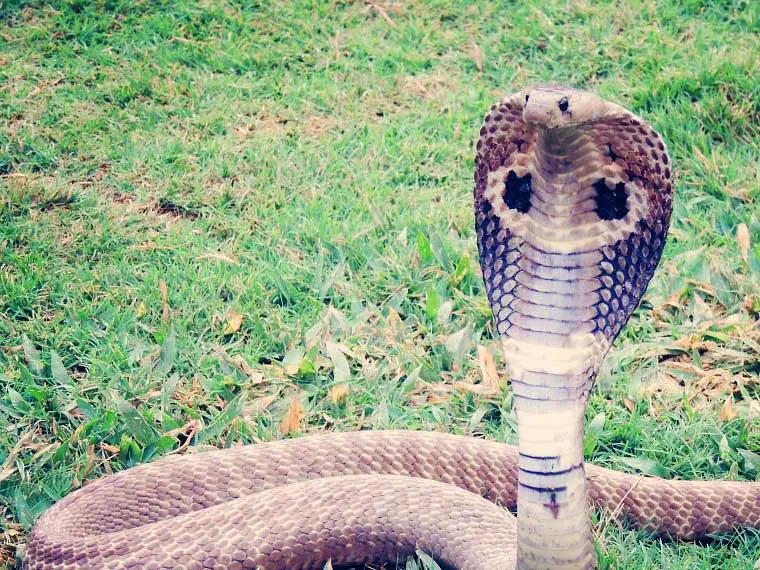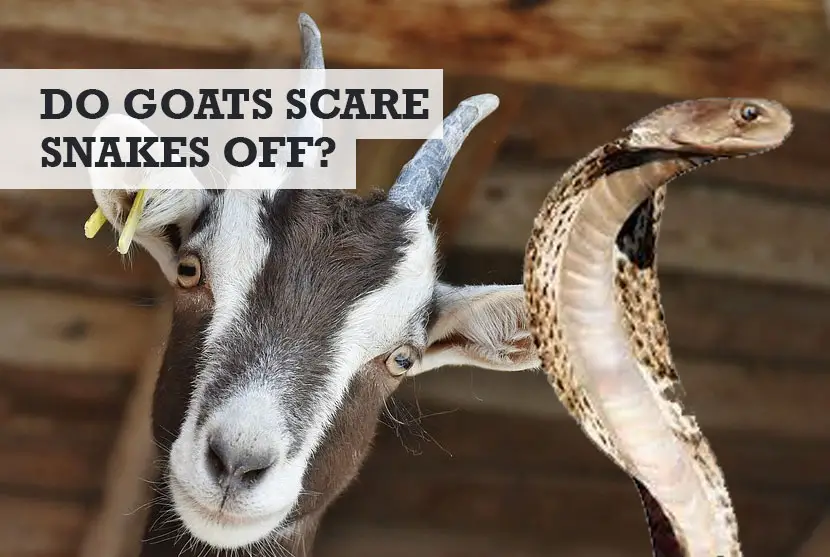Last week I listened to a radio phone in talking about snakes, and in particular a fear of snakes and what can be done to keep them away. One caller said he kept a goat to keep snakes away. I’d never heard of such a thing, so did the research into whether goats scare snakes off, or even kill them. Here’s the truth…
Do goats keep snake away or kill them? Goats do not keep snakes away, and are not known to kill them. The presence of a goat or goats in your yard will not scare snakes off.
However, there is a little more to it which might surprise you…
Goats vs snakes: the truth
Goats and snakes are not natural enemies. Neither of them preys on the other, nor do they compete for the same food. Their disputes are usually over territory.
Snakes are not afraid of goats. Not even the presence of a herd will not deter a snake from entering their grazing area or stall. Poultry birds, such as chickens, turkeys, geese and guinea fowls, are more effective at warding off unwanted reptiles.
Thankfully, most snakes are harmless and, if you and your animals can tolerate their presence, they can be useful for keeping the rodent population in check.

What happens when a snake and a goat meet?
Most venomous snakes eat small meals such as rats, moles and frogs. They will not deliberately target goats unless they feel threatened.
Unfortunately, goats are often unaware of the presence of a snake until it is too late – as snakes are not afraid of goats so won’t slither away. A loan goat, especially, is fair game. A snake can bite it while it is out grazing in a paddock or when it is sheltering in a stall.
Grazing goats are usually bitten, either on the head or on the legs, often more than once. A head bite is less dangerous than an attack on the legs, as the skull is difficult to penetrate and there are fewer blood vessels.
If goats become aware of a snake, they will have one of two responses, namely flight or fight. If they can, most goats will flee. However, a male goat that is protecting a small herd of females will rush towards the snake and stomp on it repeatedly.
What to do if your goat is bitten by a snake
Most importantly, you need to identify the snake doing the biting. If it is not venomous, the bite will heal and no further action is needed.
If it is dangerous, consult your vet immediately. The vet will be able to assess whether the bite is a dry bite, meaning no poison entered the system, which is probable if your goat was bitten on the head.
If the snake is venomous and has left deposits in the wound, it is vitally important that you identify which type of snake attacked. There are three main types of poisons associated with snake bites, each with its own specific antidote. If the wrong serum is administered, this can prove fatal to the goat.
What attracts snakes to your yard?
Forget using goats to scare off and kill goats, it won’t work. Instead, figure out why they come to your property… here’s what they like to visit for.
Snakes look for water
On a recent visit to a bull sale, I spotted a large venomous snake sharing a small pen with a massive bull that had just been sold for a king’s ransom. The snake was after the water in the bowl, next to where the bull was lying, restfully chewing the cud, totally oblivious to its presence. The new owner of the bull was somewhat less calm.
Especially in a dry season, snakes will enter a barnyard and covered shelters in search of water. Contrary to popular belief, they do not drink water with their flicking tongues. They need to immerse their jaws in water and use muscular movements to push the water into their throats. This action leaves them exposed, vulnerable and potentially dangerous.
If you live in an area that has dangerous snakes, provide water for your livestock in containers that are high up and inaccessible to snakes.
Alternatively, create a water feature a distance from the barnyard. This will attract insects which will in turn attract frogs, a popular food source for snakes. Hopefully this wildlife ecosystem will draw snakes away from the barnyard.
Snakes look for food
A barn, with all its animal feed and subsequent droppings, is a haven for rats. They have plenty of scope for foraging and can gather ample material for their nests. In turn, they provide tasty meals for fairly large snakes.
Keep rats away by regularly mucking out livestock stalls and checking in nooks for rat nests. A barnyard cat or two will deter rats from colonising a barn, and will also be a deterrent for snakes.
Moles are another food source for snakes. Moles are attracted to earthworms and grubs that feed on bulbs and other underground vegetation. They create elaborate underground systems that they use repeatedly.
One environmentally friendly way of making their warrens uninhabitable is to place livestock urine and faeces down the mole holes on a regular basis.
Snakes also find eggs to be a delicacy. When chickens are alert, they will easily kill a snake. Roosters will enjoy the contest and will eat the snake afterwards.
However, if a hen is contentedly sitting on eggs she is less likely to spot a snake sneaking up behind her and stealing one of them. A snake can slither under a sitting hen, swallow an egg, ingest the contents, and spit out the shell without her knowing.
If hens are going to share space with your goats, place their roosting perches and nesting boxes high up, making it difficult for snakes to approach them undetected. Snakes will also prey on young chicks so keep this is mind when providing shelter for breeding poultry.
Snakes look for warmth and shelter
In the cooler seasons, cold blooded snakes will look for a warm and safe place to rest, and even hibernate. They will inhabit wood piles, haystacks and even curl up next to livestock. Compost heaps and old tyres are also favorite hiding places.
Always be on the lookout for snakes around these objects. If possible keep unrelated activity, in and around the barn, to a minimum. Create a separate shelter for wood and establish your compost heap far from large animals.
Remove rocks from the area. Snakes use rocks as hiding places and heat reservoirs. In the wild, they slide onto rocks to absorb their heat so that they can kickstart their hunting day.
Inside the barn, replace bedding often and be on the lookout for unwelcome occupants while doing so.
What deters snakes?
So, if goats don’t keep snakes away, what will? Here’s the answer…
Foot traffic
Snakes do not like environments that are busy. They tend to shy away from active, high energy animals, especially humans. Dogs, cats and poultry are the best deterrents. Allow them access to the barn and yard area, to keep snakes and rodents away.
Exposed areas
Snakes feel safer in long grass and dense foliage, than traversing open spaces. Keep the area immediately adjacent to your barnyard free from pests like snakes by keeping the grass mowed regularly. Do not water it excessively as the moisture will attract snakes and their prey.
Do not establish a rockery, or grow shrubs or hedges near the barnyard as these provide hiding places for snakes. Snakes and goats are partial to patches of clover so keep these trimmed.
When landscaping the area around your house and barnyard, avoid the use of large chips of wood for mulching. You will be surprised how little space a snake needs in which to hide. Break leaves down to fine mulch before applying on your garden for the same reason.
If your barnyard is fenced, add fine chicken mesh at ground level to prevent snakes from gaining access to the area.
Strong smells
Snakes smell with their tongues. They are sensitive to strong smells. Essential oils such as spearmint and eucalyptus, and ammonia based products, such as vinegar, are successful repellents. These need to be reapplied after each rainfall. Be aware that high concentrations of vinegar will also kill vegetation.
A more permanent and cost effective way to create a snake barrier is through the use of certain vegetables and herbs. Plants that snakes find distasteful include garlic, onions, lavender and rosemary. Plant these along your barnyard perimeter to keep snakes out. An added bonus is that they also repel rats.
A much feted remedy suggests that snakes dislike human scent and that human hair will keep them at bay. Each time you brush your hair or have a haircut, save the hair and place it strategically around your goat pen.
Conclusion
Despite what you might have heard, it’s not worth your time or money buying a goat if you think it’s going to scare off or even kill snakes.
You might also like…
Image of a goat scaring a snake in the header via https://pixabay.com/photos/goat-animal-livestock-domestic-goat-3613728/

